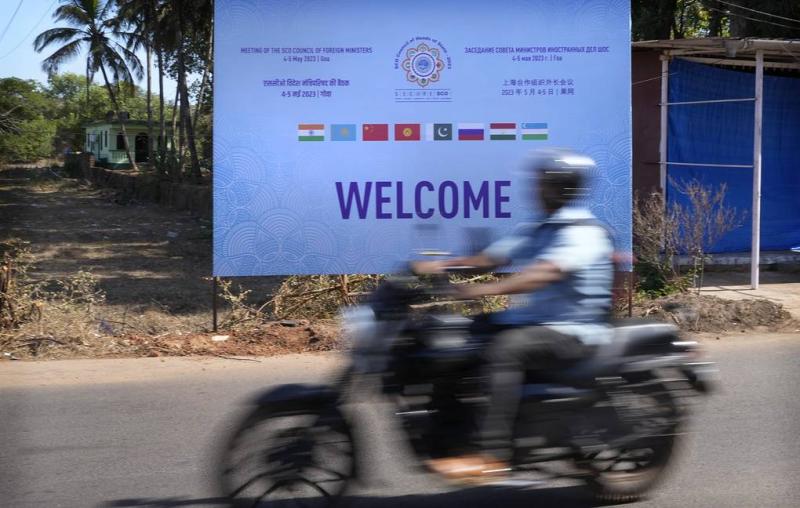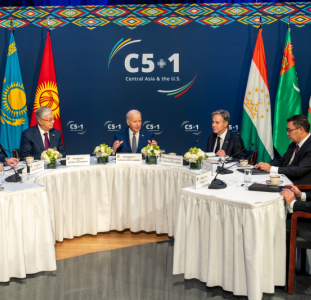
© AP Photo/Manish Swarup/TASS
Top stories from the Russian press on Thursday, June 1st, prepared by TASS
India opts to host July SCO summit in online format; the West is attempting to strong-arm Serbia into joining its anti-Russian sanctions regime; and Russian companies will need to boost investments in order to maintain current oil output levels. These stories topped Thursday’s newspaper headlines across Russia.
Vedomosti: SCO summit host India opts for online format for July leaders’ meeting
The summit of heads of state and government of the Shanghai Cooperation Organization (SCO), which India will chair for the first time, will be held in an online format on July 4, the press service of the Indian Ministry of External Affairs announced without elaborating on the reasons. Originally, the meeting was to be held face-to-face in New Delhi. Experts told Vedomosti that the decision was most likely due to India's desire to maintain working relations with all parties in the midst of the Ukrainian conflict.
On May 31, The Hindu newspaper reported, citing sources, that the decision to hold the summit remotely was made amid the ongoing Russian-Ukrainian conflict, which could overshadow President Vladimir Putin's participation. Other reasons cited by the sources included Indian Prime Minister Narendra Modi's schedule, the uncertainty about whether Chinese President Xi Jinping, a key player in the SCO, and Pakistani Prime Minister Shahbaz Sharif would be attending in person, and the lack of preparedness of the designated venue to host the high-profile event.
In turn, Russian Presidential Spokesman Dmitry Peskov told reporters that, "various options for the participation of President [Vladimir Putin] in the work of this important format are being worked out. In any case, Russia will be properly represented."
According to Alexey Kupriyanov, director of the Center for the Indian Ocean Region at the Russian Academy of Sciences’ Primakov Institute of World Economy and International Relations (IMEMO RAS), India is not a signatory to the Rome Statute of the International Criminal Court (ICC), which has issued an arrest warrant for Putin, and thus India bears no obligations to comply with the ICC’s provisions and rulings and faces none of the relevant risks. The move to an online format is more likely due to New Delhi's unwillingness to air differences with key countries that have opposing views on or varying levels of involvement in the Ukraine conflict, according to the analyst. According to Kupriyanov, India would like to maintain working relations with everyone.
At the same time, Nandan Unnikrishnan, researcher at the Indian Observer Research Foundation, believes that the decision to hold an online forum pertains not only to Russia and its extremely strained relations with India's Western partners, but also to the leaders of China and Pakistan declining to visit New Delhi. Under these conditions, the online format turns out to be more convenient for all SCO members.
Izvestia: Serbia resisting Western pressure to join anti-Russian sanctions - Russian envoy
The West is attempting to coerce Serbia into join its anti-Russian sanctions regime, threatening to employ measures ranging from visa restrictions to economic sanctions against Belgrade, Russian Ambassador to Serbia Alexander Botsan-Kharchenko told Izvestia, adding that he believes the Balkan country is not supplying weapons to Ukraine.
"At the moment, Serbia is against sanctions. And there are no deviations from this policy, which was approved by the country's president and government more than a year ago, shortly after the beginning of Russia's special military operation. Since then, the pressure from the West has increased. Brussels and Washington are the most active players, along with the EU and Germany. I still believe that Belgrade will stick to its position, which will allow us to continue our mutually beneficial relations," the ambassador told the newspaper.
As for the possibility that Belgrade may be supplying Ukraine with weapons, he noted that, "such information is being deliberately spread in order to sour relations between Russia and Serbia. President [Aleksandar] Vucic has stated publicly and in private conversations that Belgrade is not engaged in transferring weapons to the Kiev regime." At the same time, he noted that Serbia has a well-developed defense sector and, thus, "it is possible that such [Serbian-made] weapons, previously procured by third countries, may end up in Ukraine."
At the moment, no high-level interactions are being planned between Serbian President Aleksandar Vucic and Russian President Vladimir Putin. "Nevertheless, President Vucic keeps us informed with all relevant information about the approaches he is taking and the state of affairs in the region with the full understanding that we will convey it to the president of Russia and Russia’s top leadership," the ambassador said.
Kommersant: US seeks openings with Iran to regain clout amid Tehran’s reconciliation drive
The International Atomic Energy Agency (IAEA) has once again accused Iran of violating the guidelines for nuclear activities. However, the international inspectors made a positive announcement, stating that they no longer have any questions for Iran about previously discovered uranium particles enriched to 83.7%, as close as possible to the level required for producing a nuclear weapon. At the same time, it was revealed that the US is seeking a path to resume talks with Iran on curbing its nuclear program, Kommersant writes.
According to the newspaper, Washington's desire to resume communications with Tehran coincides with a significant thaw in Iran's relations with its Arab neighbors, most notably Tehran’s reconciliation with Saudi Arabia this spring. At the same time, concerns have grown that Iran has accelerated its nuclear program.
"Washington's renewed interest in [developing] more active contacts with Tehran on the nuclear deal is probably due to the dynamics of relations between Iran and other countries, among a number of other factors," Anton Khlopkov, head of the Center for Energy and Security, told Kommersant.
The expert noted that these factors include Iranian-Russian and Iranian-Chinese relations, the restoration of diplomatic relations between Iran and Saudi Arabia, and Tehran's overall goal of restoring its relations with the Arab monarchies of the Persian Gulf. "The United States has probably realized that its inflexible position <...> is unproductive, that it is losing its voice and place in Iranian affairs, and that, according to Washington, it is now returning to more pragmatic approaches," the expert noted. At the same time, he admitted that the chances of reviving the nuclear deal are "extremely low."
Adlan Margoev, a researcher at the Moscow State Institute of International Relations’ (MGIMO University) Institute of International Studies, said that, "even a short respite could help the Iranian government stabilize the [country’s] macroeconomic situation."
Izvestia: Moscow prepared to supply weapons to Mozambique
During his visit to Mozambique, Russian Foreign Minister Sergey Lavrov said that Moscow is prepared to supply Maputo with the weapons it needs to combat terrorism. The African nation has an overall interest in expanding its cooperation with Russia in both military-technical matters and trade and economic relations, said Mozambican Deputy Minister of Foreign Affairs and Cooperation Manuel Jose Goncalves, Izvestia writes.
Following talks with Mozambican President Filipe Nyusi, Lavrov announced the intention of both sides to resume meetings of the intergovernmental commission on military-technical cooperation, which were suspended due to the COVID-19 pandemic. He emphasized that Moscow is prepared to supply Mozambique with military equipment for the fight against terrorism. The Russian foreign minister also highlighted the interest that Russian companies have in the Mozambican market, including truck-maker Kamaz and energy giant Inter RAO. In addition, Russian metallurgical companies are seeking to work with Maputo on development opportunities in Mozambique, the top diplomat added.
According to Nikita Panin, program coordinator at the Russian International Affairs Council (RIAC) and postgraduate student at the Russian Academy of Sciences’ Institute for African Studies, Maputo and Moscow signed an agreement in 2015 that should facilitate taking the two countries’ already close contacts in the area of military cooperation to a new level. "A significant part of Mozambique's arsenal of weapons, which the country desperately needs to fight extremist and terrorist groups, comes from Russia," the analyst noted.
"The countries are trying to find new prospects for strengthening bilateral contacts," the expert noted. Mozambique, he added, is under enormous external pressure, but the country is not abandoning its cooperation with Russia. The fundamental goal of the parties is to accelerate cooperation and increase the volume of trade, the expert concluded.
Vedomosti: Russian producers must boost investment to keep oil output at current level
To maintain Russia’s current level of oil production, Russian oil companies will have to boost their investments by 62 bln rubles ($765.93 mln) every year between 2024 and 2030, Kasatkin Consulting (formerly Deloitte CIS) told Vedomosti.
Russia's investments in oil production will grow by 17.7% to 1.8 trillion rubles ($22.23 bln) by 2022. According to Kasatkin Consulting, oil companies "continued to actively invest" in the first quarter of 2023, but in the second quarter a slow decline in investments began, which will continue until the end of the year. As a result, experts expect that investments in 2023 will be 7.6% lower than in 2022, totaling 1.68 trillion rubles ($20.75 bln).
According to Finam analyst Alexander Potavin, if investments are maintained at the 2022 level of 1.8 trillion rubles ($22.23 bln), oil production in Russia may fall by 4% in 2025 compared to 2023, and by 10% in 2030. According to the expert, an oil price ceiling of $60 per barrel "increases the costs of oil companies, lowers the price of oil and, as a result, reduces the profits that could be plowed back into investments."
In addition to the volume of investment programs, the dynamics of Russian oil production will be shaped by restrictions on exports of Russian raw materials and the sanctions ban on the supply of oil production equipment and technologies to the country, Kirill Rodionov, an expert at the Institute for the Development of Technologies in the Fuel and Energy Complex, told the newspaper.









